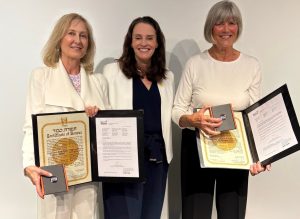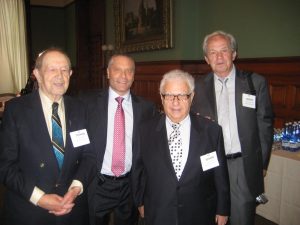Rosemary Sullivan, the embattled Canadian historian behind a controversial new book about Anne Frank, has fired back at its recall in the Netherlands.
She blames the controversy on the media, and foreign historians—and she’s blasting her Dutch publisher.
The author of The Betrayal of Anne Frank: A Cold Case Investigation issued a statement on March 24 in the wake of Ambo Anthos announcing it would stop selling the book. The publisher asked stores in the Netherlands to return any unsold copies, and also issued a second apology for having offended anyone.
The reaction came soon after a team of Dutch historians published a 69-page refutation of the book, which they released at a conference at the University of Amsterdam on March 22. It concluded that the findings portrayed in the book by the Toronto-based author are impossible, and worse: they desecrate the legacy of Anne Frank’s memory.
The Betrayal outlines why the investigators are 85 percent certain it was Arnold van den Bergh, a Dutch Jewish notary from Amsterdam, who told the Nazis where the Franks and others were in hiding.
Sullivan is a historian with over a dozen critically acclaimed books to her name. Villa Air-Bel: World War II, Escape, and a House in Marseille won a Canadian Jewish Book Award in 2007. For her latest, she spent three years writing about a six-year project by a team of two dozen investigators, led by a former FBI police officer, Vincent Pankoke.
The investigation used modern crime-solving techniques, and artificial intelligence, to find out who was most likely to have told the Nazis where Anne and her family were hiding.
Nazis raided the Secret Annex on Aug. 4, 1944. The Franks were deported to their deaths, along with another family. (Anne’s father, Otto Frank, survived the Holocaust and returned home to publish his daughter’s diary.)
In her statement, Sullivan acknowledges that she wasn’t directly involved in the investigation, but came in at the halfway point to chronicle their work. She maintains her “full confidence” in the investigation and their findings of the likeliest suspect to give a list of addresses to the Nazis.
“It is the critics who refer to Van den Bergh as a ‘traitor.’ The team is always careful to see him as a victim, whose motive was to save his family from deportation and death under the Nazi occupation,” Sullivan writes.
She rebukes her Dutch publisher for twice issuing an apology, and then pulling the book, without first requesting a response from her and the forensic team. And she blames the media for revealing the identity of the notary’s granddaughter. Mirjam de Gorter, a Dutch violinist, was interviewed for the cold case investigation, but has since publicly rejected the accusations against her grandfather.
“The team has also been careful to protect the identity of the granddaughter of Van den Bergh. The way she has been manipulated by the press is regrettable,” Sullivan writes.
Canadian publisher is keeping it available
HarperCollins, which published The Betrayal of Anne Frank in North America, continues to stand by the book.
“While we recognize there has been some criticism to the findings, the investigation was done with respect and the utmost care for an extremely sensitive topic,” said a spokesperson, in an email to The CJN.
Sullivan’s response came in the wake of a damning report on the book by six Netherlands-based historians, which they carried out after it was published.
As experts in Dutch Jewish history and the history of the Holocaust, they felt they owed it to their profession, and to the legacy of Anne Frank, and to the Jewish community.
The historians slammed the findings of the cold-case investigation, including the methods and assumptions used in the project. The study breaks down the timing of the alleged betrayer’s Holocaust experience: including where and when Arnold van den Bergh and his wife and daughters went into hiding, and the likelihood that he could have ever possessed an actual list of addresses of Jews in hiding, which he then supposedly gave to the Nazis.
“We noticed that a lot of the historical context got lost, and wrong assumptions were raised that caused a distortion, rather than creating a better understanding of the past,” said Bart Wallet, a professor of Jewish studies at the University of Amsterdam, who was one of the authors of the report.
Thrilling cold case
The cold-case team—and Rosemary Sullivan’s book—said the Jewish notary felt forced to hand over a list of Jewish addresses to the Nazis in order to save his own family, because he felt increasingly in danger of deportation though the fall of 1943 and beyond. Although the investigators did not find any hard copies of such lists, the book claims these must have existed, and theorized that Van den Bergh would have had access to them due to his position as a member of Amsterdam’s Jewish Council.
The team also relied heavily on an anonymous note that Otto Frank received after the war, which fingered Van den Bergh as his betrayer.
Of the 23,000 Jews who were in hiding in the Netherlands, one third were betrayed. In all, 107,000 Dutch Jews were murdered in the Holocaust.
Granddaughter goes public
Van den Bergh’s granddaughter, Mirjam de Gorter, was present when the historians released their findings in Amsterdam on Tuesday. De Gorter has kept a low public profile since the Jan. 17 launch of Rosemary Sullivan’s book in the Netherlands.
However, she now admits how devastating it’s been to be at the centre of the worldwide attention to her family and her late grandfather. De Gorter says the interviews which she gave to the cold-case team were misused.
“We realized my grandfather would be presented in the book but we didn’t think he would be presented as a traitor,” De Gorter told the audience on March 22.
She claims she told the team several times that her grandparents were already in hiding in Laren, outside of Amsterdam, six months before the Franks were picked up. The book portrays him as walking freely through Amsterdam in 1944.
The family is now appealing to HarperCollins to pull the book from sale in the rest of the world, too.
The CJN reached out to the Indigo Books and Music chain, whose founder Heather Reisman, interviewed Rosemary Sullivan and Vincent Pankoke on March 2, during an online event presented by several Jewish community centres in Toronto.
At the time, Reisman said that if people were to read only one book this year, it should be The Betrayal of Anne Frank, because it was so “provocative.”
A request for a comment about the new developments was sent to Indigo’s head office, but they didn’t make anyone available.
Author

Ellin is a journalist and author who has worked for CTV News, CBC News, The Canadian Press and JazzFM. She authored the book Double Threat: Canadian Jews, the Military and WWII (2019) and contributed to Northern Lights: A Canadian Jewish History (2020). Currently a resident of Richmond Hill, Ont., she is a fan of Outlander, gardening, birdwatching and the Toronto Maple Leafs. Contact her at [email protected].
View all posts








